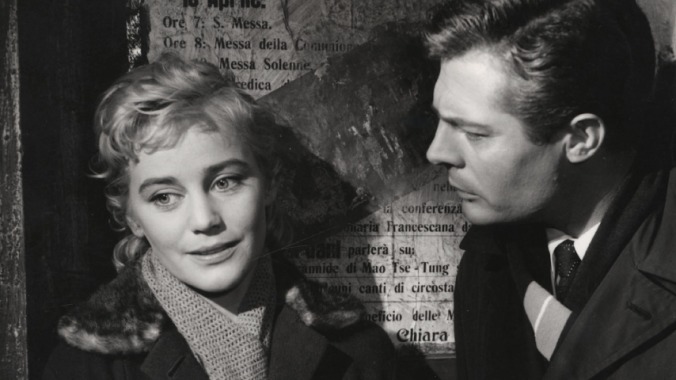Film School: White Nights
Subscriber Exclusive

Welcome to Film School! This is a column focused on movie history and all the stars, filmmakers, events, laws and, yes, movies that helped write it. Film School is a place to learn—no homework required.
At the very least, you’ve seen his image. Kissing Anita Ekberg in the Trevi Fountain. Wearing the hell out of a suit. Making smoking look devastatingly debonair. During the 1960s, Marcello Mastroianni was the coolest man in Italy—and (with the possible exception of Alain Delon), maybe even the whole of Europe.
But there was so much more to him than that. For September’s Film School, to mark the centenary of his birth, we’ll be looking at Mastroianni’s mammoth career, his formidable range and his legendary collaborators, to explore just what it is that made him such an enduring icon.
Marcello Mastroianni was certainly not an overnight success. A handful of extra roles were all that came his way throughout the 1940s. After escaping from a labor camp in WWII, he found work as an accountant with the Italian department of British studio Eagle-Lion Films, which kept him around the movies, even if he was way off in the background. Around that time, he established a pivotal relationship with acclaimed director Luchino Visconti, who cast him in his prestigious theatrical troupe (among many other meaty parts, he’d play Stanley in A Streetcar Named Desire). Visconti would prove a vital figure in his screen career, too.
The next decade was when it all started to kick into gear for Mastroianni. In 1950’s The Accusation, he had his debut lead role, as a man framed for murder by his lover’s husband. There’s no trace of nerves or awkwardness in that first major performance; he seemed a fully-formed leading man from the get-go. Unfortunately, the disjointed, tensionless movie did him few favors, and he soon fell much further down the call sheet.
Light, romantic, ensemble pieces were all the rage in Italy during the 1950s, and Mastroianni appeared in a great many of them. In films like Sunday in August, Three Girls from Rome, and Paris Is Always Paris, he’d pop up as one of a vast cast, to make an appealing but brief impression.
The ensemble pieces weren’t all throwaway fluff however. In 1954’s Chronicle of Poor Lovers, Mastroianni played Ugo, the town Casanova who gradually becomes drawn into the battle against fascism. Though he’s not the main character, he has the biggest arc and the best opportunity to showcase his range. Initially he’s a charming gadabout, but the seriousness of the situation settles on his shoulders with the appropriate gravitas, and by the third act, we truly do believe he’s grown up in front of our eyes. It was an early, moving example of all he could do, even in a secondary role.
-

-

-

-

-

-

-

-

-

-

-

-

-

-

-

-

-

-

-

-

-

-

-

-

-

-

-

-

-

-

-

-

-

-

-

-

-

-

-

-








































